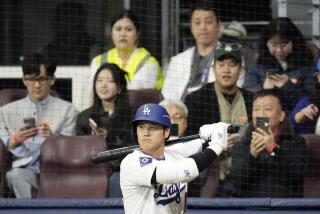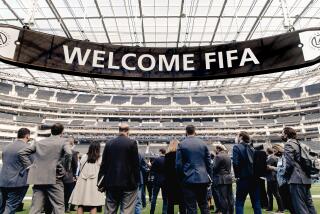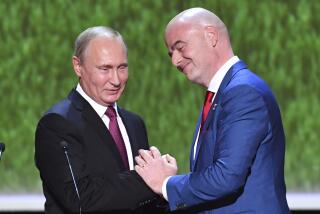A Political Football Lands in Japan and South Korea
In a stunning, precedent-setting and highly controversial decision Friday, FIFA, the world governing body for soccer, awarded World Cup 2002 to Japan and South Korea.
That’s right, both countries.
Never before in the 66-year history of soccer’s quadrennial world championship tournament have two nations shared the finals.
The action in Zurich opens the way for other, smaller countries to submit joint bids in the future.
It was also a direct slap at FIFA President Joao Havelange, the crusty, 80-year-old Brazilian who had virtually promised Japan the event.
The vote by FIFA’s 21-member executive committee could signal the beginning of Havelange’s downfall, more than two decades after he came to power.
The outcome, announced unexpectedly 24 hours earlier than planned, marked the climax of the most expensive, intense and bitter battle ever fought for the right to stage the World Cup.
The decision was immediately criticized, not least by the Japanese, who spent more than $60 million on their campaign and believed they were a lock.
South Korea wanted the tournament alone, but agreed to share it if that was the only choice. Japan, until the last minute, refused to compromise.
The Japanese were certain they would prevail, especially after comments by Havelange earlier in the week.
“FIFA rules do not allow co-hosting of the World Cup,” he had said. “As long as I am FIFA president, that will not change.”
It changed Friday, the charge led Lennart Johansson, a 66-year-old Swede who is president of UEFA, European soccer’s ruling body, and a declared candidate for the FIFA presidency at the next election in 1998.
Johansson cast his weight behind South Korea’s bid, and although that was not enough to win the day completely, it did bring about the historic compromise.
“The decision was made between the two countries last night [Thursday],” Johansson said. “Officials met and agreed on a compromise. It is good for soccer and the Japanese have every right to be happy. The Koreans are also pleased with the decision.”
In fact, the sharing arrangement was greeted far more enthusiastically in Seoul than in Tokyo.
South Korean President Kim Young-Sam sent a congratulatory message to his country’s delegation in Zurich.
“The co-hosting of the 2002 World Cup between South Korea and Japan will be an opportunity to further solidify friendly relations,” Kim said.
That will be a first, given the countries’ history. The two-year battle for the World Cup was marked by heated exchanges between the rivals, but those were only a prelude to the clashes ahead.
In its announcement, FIFA made no mention of exactly how the tournament will be shared. Obviously, both countries will automatically qualify, but which country will get the showpiece final? What about the opening ceremony? How will such things as finances, security and ticketing be handled between nations with different languages, currencies and economies?
A logistic nightmare looms.
In addition, there are the internal problems in each country caused by the vote. For example, the number of cities that will have games will have to be cut in half. The fights to be one of the survivors will be fierce.
And just as divisive, no doubt, as the battles of the last two years.
Early in the contest, the Japanese were viewed as a shoo-in. Japan’s economic might, World Cup sponsorship by Japanese corporations such as Canon and Fuji film, the country’s successful launch of the J-League in 1993, and the government’s willingness to spend $5.5 billion on refurbishing or building state-of-the-art stadiums for the event seemed to make Japan a lock.
But during the last year, South Korea’s campaign kicked into high gear. Its bid promised $1.3 billion in new and remodeled stadiums. The Koreans also scored points by emphasizing their on-field success compared to the Japanese. South Korea has qualified for and competed in the World Cup on four occasions. Japan has never qualified.
The rivalry was intense from the beginning.
The Japanese called in World Cup winners Pele of Brazil and Sir Bobby Charlton of England as their official spokesmen. The Koreans countered with World Cup winner Diego Maradona of Argentina. Japan put billboards up at every significant game around the world. So did South Korea. Japanese delegations were present at all major tournaments, dispensing goodwill and gifts. Korean delegations matched them stride for stride.
On the surface, there was nothing to choose between the two bids.
Both countries had proven in their handling of the Olympic Games--Tokyo in 1964 and Sapporo in 1972, and Seoul in 1988--that they can stage an international event of this magnitude. Both countries can assure modern stadiums, filled with fans, supported by all the technology and infrastructure necessary to produce a successful tournament. Both have the firm support of their respective governments and of numerous deep-pocket sponsors.
The fact that little love is lost between Japan and South Korea--Japan colonized Korea from 1910-1945--gave the race for 2002 an added edge.
It became no longer merely a matter of sport, or even of economics. Winning meant saving face. National pride was on the line.
Which is why the promises made by both sides were so enormous.
The Koreans, for example, said that if they won the vote they would turn over all profits from the tournament to FIFA and its regional confederations to be used for the development of the sport.
“This pledge is made with the intention of providing a significant source of funds to ensure an auspicious start to football’s new century,” said Song Young-Shik, secretary-general of the Korean bid committee.
“In particular, we hope that this financial contribution will hasten the progress of the game in developing football nations as well as rewarding the world’s leading football nations for their roles in promoting the sport.”
The profits will not be mere kimchi. Conservative estimates put them at about $78 million.
“We believe we are the rightful choice,” Koo Pyong-Hwoi, chairman of the Korean bid committee said before the vote was announced. “We believe we have earned this honor.”
He meant on the field of play, not in political corridors.
In 1954, South Korea became the first Asian country to reach the World Cup finals. It also qualified in 1986, 1990 and 1994, and its performances against Argentina and Italy in Mexico ’86 and against Germany in USA ’94 were especially noteworthy. Also, South Korea’s professional league is 10 years older than Japan’s.
“If the World Cup hosting was to be decided on football issues alone, we feel we would be almost certain to be chosen,” Koo said.
It was a point the Japanese found difficult to argue against.
South Korea had 16 candidate cities in mind for the World Cup: Seoul, Pusan, Taegu, Inchon, Kwangju, Taejon, Suwon, Kangnung, Chongwon, Chonan, Chonju, Mogpo, Pohang, Changwon, Ulsan and Sogwipo. In 11 of the cities, a new stadium was planned. In each of the five others, an existing stadium was to be expanded and upgraded to international standards. Capacity was to range from 43,000 in Taejon to 67,363 in Seoul.
Now, the Koreans have to chop that list in half.
Japan’s bid took the high-tech road. Whereas South Korea promised a financial windfall, Japan promises a legacy of a different kind.
The country was ready to spend $5.5 billion on its 15 World Cup stadiums, 11 of them of new and futuristic design, the remaining four renovated. They are in Sapporo, Aomori, Miyagi, Niigata, Ibaraki, Saitama, Chiba, Yokohama, Shizuoka, Aichi, Kyoto, Osaka, Kobe, Hiroshima and Oita. Their capacity was to range from 41,716 in Aomori to 70,336 at Yokohama International Stadium, candidate for the 2002 final.
Now, Japan has to pare that list considerably.
But it was Japan’s concept of the “virtual stadium” that excited neutral observers.
The idea is to televise sold-out games to other stadiums, where immense parabolic screens, 100 feet high and 250 feet wide, on either side of the field can show the game live. This concept of “turning entire grounds into three-dimensional theaters” is likely to bring a new phrase into the sporting lexicon, virtual spectators.
“It would take no more than five years to have such a system fully functional,” said Junji Ogura, general secretary and chief executive of Japan’s bid committee. Ogura estimated that total “attendance” in 2002 could thereby exceed 4 million fans. The USA ’94 World Cup drew 3.58 million.
“This would mean more spectators and more revenues for FIFA,” Ogura said.
The question is, will the Japanese go ahead with the plan, expanding it to cover games on both sides of the Sea of Japan? No answer was immediately forthcoming.
FIFA Vice President and Korean Football Assn. President Chung Mong-Joon, the man who spearheaded South Korea’s campaign, once scoffed at the plan.
“Given our ability, we could do the same thing by 2002,” he said. Now, South Korea may be forced to do so.
Along with the “virtual stadiums,” the Japanese also proposed establishing a whole new electronic infrastructure for the sport worldwide. Sort of a World Wide Soccer Web. It calls for Internet servers at each of the six continental confederation headquarters, including New York, as well as at FIFA headquarters in Switzerland and at World Cup 2002 headquarters in Japan.
“The user could thus access information about football any time, anywhere,” according to Japanese bid documents. “It would provide people with yet another way to enjoy the World Cup, one that cannot be experienced via television, the newspaper or other mass media.”
And in response to South Korea’s idea for turning over all profits, Japan’s bid stated that “should the virtual stadium proposal be approved, profit incurred would be put forward to set up the 21st Century World Cup Memorial Fund. The fund would be used for the development and popularization of worldwide football in the 21st Century under the guidance of FIFA.”
It all made for a very difficult choice for FIFA, which wants soccer to succeed in both countries. Japan had the economic clout and the technology to spur the sport into the next century. South Korea had the tradition of success on the field and a fanatical soccer populace.
It was too close to call, and FIFA chose the easy way out. Whether it was the correct way, only time will tell.
(BEGIN TEXT OF INFOBOX / INFOGRAPHIC)
THE REACTION
SOUTH KOREA: Chung Mong-Joon, FIFA vice president and Korea Football Assn. president: “I am a rather conservative man and it will take me a couple of days to decide whether I am happy with this decision or not. I hope I am happy.”
JAPAN: Ken Naganuma, president of the Japanese bid committee: “This presents us with many problems to solve. We will do our best to make this bear fruit. It will be the first co-hosted World Cup finals, the first in the 21st century and the first in Asia. We believe it must be a success.”







